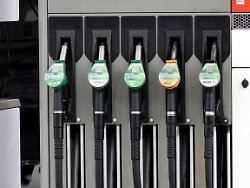Wednesday October 27, 2021
Study on CO2 tax
FDP plans could chase gasoline prices to 2.50 euros
Time is running out: the German transport sector will have to cut its emissions by almost half by 2030. One possibility would be to achieve the climate goals through CO2 taxes alone. According to a new study, however, that would cost motorists dearly.
According to a study, car drivers would be more expensive at the gas station to achieve the climate targets solely through the CO2 price than through a bundle of measures. With a pure market solution for the transport sector, the price per tonne of carbon dioxide would have to rise to 450 euros by 2030, as a Prognos study on behalf of the environmental organization Transport & Environment (T&E) shows.
That means an increase in the gasoline price to 2.50 euros and the diesel price to 2.64 euros. The alternative route via a mix of instruments including a surcharge when buying a combustion engine therefore leads to a less pronounced increase to 1.90 euros per liter of petrol and 1.96 euros per liter of diesel.
In the coalition negotiations that are now beginning, the FDP favors a solution primarily through the CO2 price, while the Greens and the SPD want further instruments. The transport sector is seen as particularly problematic. According to the Climate Act, it will have to practically halve its emissions by 2030. The switch to an electric fleet for cars is the central element. “If the right measures are not implemented now, the government will have to rely on a high carbon price, which would put a heavy burden on low-income families,” warned T&E division manager Jekaterina Boening.
Instead, the organization advocates abolishing the low-cost company car taxation for combustion cars and introducing a bonus-malus system when buying cars. The buyer of cars with high CO2 emissions finances the purchase premiums for e-cars with a surcharge.
The new federal government must also work to impose even stricter CO2 reduction targets for new cars in the auto industry, demands Transport & Environment. The 55 percent reduction by 2030 proposed by the EU will be achieved by BMW, Daimler and Volkswagen earlier, according to their plans.
